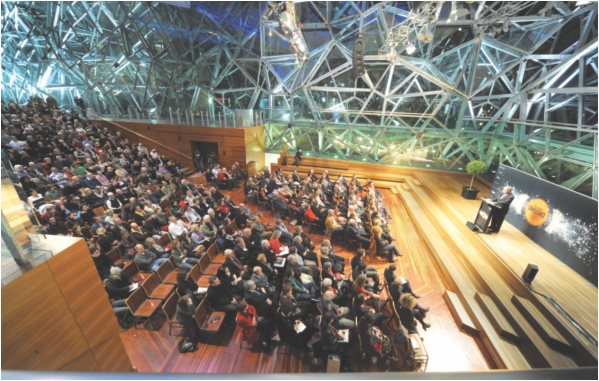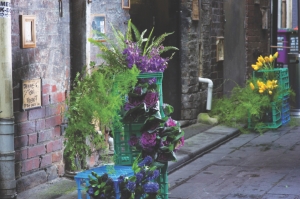| Home - Back Issues - The Team - Contact Us |
 |
| Volume 11 |Issue 39| October 05, 2012 | |
|
|
Impressions
Sweet Springtime Snapshot Rebecca Haque Springtime in Melbourne, her fifth time in this abode of blood-ties and new generation, but her first in this season of renewal. The petite bespectacled brown scholar walks out of the Baillieu Library of the University of Melbourne with a sheaf of notes on a shimmering Saturday afternoon. Her small footsteps quickly seek the shade of the old medieval-style arched pathway, and out again almost running in the sunshine across the quadrangle down to the main street for the tram which will take her to the City Centre. She anxiously lifts her left arm to peer from the top of her myopic lenses at the tiny oval face of the analog wristwatch. The Melbourne Writers Festival is on, and she has eagerly planned on strict punctuality to attend two important sessions listed under the Fiction and Poetry category. She takes out a thin notebook and a ball-point pen from her large floppy shoulder-bag upon entering the large room on Level 2 at the Yarra building in Federation Square. She is feeling good, smartly attired and confident in her chosen element, eyes limpid with anticipation and suppressed excitement. She finds an empty chair in the third row next to a burly elderly gentleman, who smiles and initiates a genial conversation with the opening gambit, “So, what brings you here?” Without batting an eyelid, she smiles back, and casually, demurely, replies, “Well, literature is my area, and I have come a long way.” Spring shower and sparkling rainbow beads on leafy bushes two hours later, she sits near the Esplanade by the Yarra River, beyond St. Kilda St. She caresses the luminescent virgin covers of the two books, collections of the fascinating new genre of 'micro fictions' she has just bought at the booth in the cavernous Atrium attached to the National Gallery of Victoria. The interaction during the Q & A session had both Rodney Hall and Josephine Rowe pleasantly smiling up at her as they wrote her name before signing their individually authored collections. She had asked them to add the name of the city after the flourish of signature and date. They do. Silent in the cool breeze, serene amidst the panorama of lush grass on the sloping banks, and the canopy of glistening flowering trees under fluffs of gliding cumulous clouds, she feels in her heart the prelude to a Wordsworthian symphony . Enveloped thus in such solitary anonymity, she bites into the orange tangy crescent mandarin piece, almost swooning as the rich sour-sweet juice of the pulp mixes with the bitter-strong spray of the slithery peel to give her a cocktail-kick in the nose and the gullet. Overcome, momentarily, with an organic rush of inexplicable melancholy, she sways on the crest of a wave of wistfulness, with the faint waft of a desire for sensuous company, for the romance of magic eyes and the loving deep voice . She leans gently forward and flirts coyly with the mirrored river currents and the fluttering speckled spring blossoms. Her wet lips suck in fresh air and she softly exclaims, “Ah, Keats! Thou should'st be living at this hour.” Sliding into psychosomatic reverie, a series of streaming telekinetic imagery of memory and music flow from the hidden recesses of the frontal lobe. Reality and illusion form a double helix for a few seconds; a low self-mocking lilting trill of a song escapes her larynx as soon as she stirs the fumes in her brain to unravel the entangled elongated strands to gaze clearly at the separate skeins of sensual experience. The black steel-rimmed spectacles lie on her lap, and the mascara-laden eyelashes dip for seven seconds while she is meltingly awash in the surroundsound of Satyajit Ray's enchanting Charulata in the garden on the swing offering Tagore's divine verse to the firmament. Spontaneously, born of close dearly-felt association, perchance, with similar expression of feminine vocal creativity, a vivid photo-montage of reality rolls into the scholar's mind. Supersonic cinematic speed shuttles the woman sitting by the Yarra on ancient Aboriginal ground five decades back in time to the land of her birth, to the flat flood-plain, the intricate snaky tributaries, and the muddy, splashy energy of the paddy fields of East Bengal. She sits up, alert and quietly still in the present, the pupils of her widening eyes looking deeply inward, engaged with unlocking the portal into previous life. Miraculously, she is suddenly back in the warm picturesque hilltop bungalow in Comilla Cantonment in the year 1963, on the evening of a special northern spring day which , even now, makes her glow with complete contentment.
She sees it all again, feels it all again, the thrill and the surge of joy. It is after Maghreb, and she is sitting on the big bed in her parent's tidy room. Her brothers are sitting by her side. With shining eyes and adoring faces, they are all watching their mother. Mother and father are invited to a grand dinner party, where mother is going to sing a Tagore song. The light bulb over the dressing table casts its golden rays upon the whole family, and now the scholar sees it all in slow motion, as in a mimed tableau. Mother is regally draped in a cream and maroon Murshidabadi silk sari, with the cream silk blouse (tailored in New Market, Dacca) in the chic high-collar style favoured by Suchitra Sen in the films of that era. In repose, with the gold 'jhumka' earrings, the striking features, the long thick silky hair coiled in a neat bun, and the elegant slender figure, her mother does resemble Suchitra. (In fact, a female guest with a loud voice mentions this resemblance; mother is demure and shyly turns her face way, father acknowledges with a lingering smile of inner pride and proprietorship. Later, secretly, mother shares this party pot-pourri with her little girl, and they both dissolve in embracing love and laughter.) Mother has a clear beautiful voice, and she sings her favourite Tagore songs all through the day as she cooks and sews, or at night when she serenades her little ones into sweet dreamland. For tonight's rendition, she has practiced, singing along with Kanika Bandopadhaya on the long-playing record, with father lifting the arm of the gramophone needle to place it back or forth on the exact groove to help replay any particular lyric. Tonight, before leaving for the party, father requests mother to sing the entire song once again, without accompaniment. She sits facing her children, and, gathering the paisley aanchal in a fan-fold on her lap, she starts to sing. The melody and the lyrics smoothly slice the expectant tension in the little girl's heart as she hears the sweet tones, as sweet as any Shantiniketan artiste's. It is perfect; for the little girl, the perfect seed-time; the whole wide world reverberating in one small room, with the promise of freedom and limitless possibilities. Heaven in a woman's voice. A shadow of a mist beneath her eyelids streams the scholar silently back to the declining sun over the Yarra. Next Saturday, she has to return north past the Equator to the hectic life of heat and dust, of working and playing, laughing and crying, loving and caring, arguing and soothing a life crowded with people and noise. This evening, alone by the spate of softly flowing water, her heart is a throbbing glowing ember, rekindled by the springtime snapshot from the past. Suddenly, lyrics from her own special Tagore song, the one which hypnotises, mesmerises her heart, float to her tongue and vibrate in her sinews: dolau, dolau, dolau, amar hridoy -- 'cradle my heart'. Next week, she will gently part her heart, leaving the right ventricle over the Yarra for her only child to cradle, and fly away with just the left ventricle for the old mother at home to cradle in the city by the Buriganga .
(The writer is Professor, Department of English, University of Dhaka.)
|
||
Copyright
(R) thedailystar.net 2012 |

